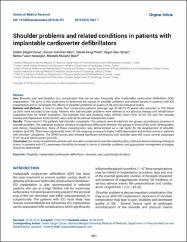| dc.contributor.author | Sezgin Özcan, Didem | |
| dc.contributor.author | Gülcihan Balcı, Kevser | |
| dc.contributor.author | Polat, Cemile Sevgi | |
| dc.contributor.author | Özcan, Özgür Ulaş | |
| dc.contributor.author | Köseoğlu, Belma Füsün | |
| dc.contributor.author | Balcı, Mustafa Mücahit | |
| dc.date.accessioned | 2020-03-04T13:37:45Z | |
| dc.date.available | 2020-03-04T13:37:45Z | |
| dc.date.issued | 2019 | en_US |
| dc.identifier.citation | Sezgin Özcan, D., Gülcihan Balcı, K., Polat, C. S., Özcan, Ö. U., Köseoğlu, B. F. ve Balcı, M. M. (2019). Shoulder problems and related conditions in patients with implantable cardioverter defibrillators. Annals of Medical Research, 26(9), 1861-1867. http://doi.org/10.5455/annalsmedres.2019.06.351 | en_US |
| dc.identifier.issn | 2636-7688 | |
| dc.identifier.uri | http://doi.org/10.5455/annalsmedres.2019.06.351 | |
| dc.identifier.uri | https://hdl.handle.net/20.500.12511/4989 | |
| dc.description.abstract | Aim: Shoulder pain and disability is a complication that can be seen frequently after implantable cardioverter defibrillator (ICD) implantation. The aims of this study were to determine the causes of shoulder problems and related factors in patients with ICD implantation and to investigate the effects of shoulder problems on quality of life and psychological status. Material and Methods: A total of ninety-four consecutive patients (average age 59.38±10.75 years) who admitted to ICD follow up clinic were included in the study. Patients who had shoulder problems were referred to our physical therapy and rehabilitation outpatient clinic for further evaluation. The Shoulder Pain and Disability Index (SPADI), Short Form-36 (SF-36) and The Hospital Anxiety and Depression Scale (HADS) were used as the clinical assessment scales. Results: Thirty-nine (41.5%) patients had shoulder complaints. The patients were divided into two groups according to presence of shoulder problem. The statistical analysis revealed no significant differences between the groups in terms of the socio-demographic and clinical characteristics. None of these characteristics was demonstrated as a risk factor for the development of shoulder problem (p>0.05). There were significantly lower SF-36 subgroup scores and higher HADS depression and anxiety scores in patients with shoulder complaints. The SPADI scores also showed significant correlations with shoulder pain VAS score, several subgroups of SF-36 and HADS scores (p<0.05). Conclusion: Our study revealed that patients with shoulder complications had decreased quality of life and deteriorated psychological status. In patients with ICD, awareness should be increased in terms of shoulder problems and appropriate management strategies should be determined. | en_US |
| dc.language.iso | eng | en_US |
| dc.rights | info:eu-repo/semantics/openAccess | en_US |
| dc.subject | Disability | en_US |
| dc.subject | Implantable Cardioverter Defibrillator | en_US |
| dc.subject | Shoulder | en_US |
| dc.subject | Pain | en_US |
| dc.subject | Psychological Status | en_US |
| dc.title | Shoulder problems and related conditions in patients with implantable cardioverter defibrillators | en_US |
| dc.type | article | en_US |
| dc.relation.ispartof | Annals of Medical Research | en_US |
| dc.department | İstanbul Medipol Üniversitesi, Tıp Fakültesi, Dahili Tıp Bilimleri Bölümü, Fizik Tedavi ve Rehabilitasyon Ana Bilim Dalı | en_US |
| dc.department | İstanbul Medipol Üniversitesi, Tıp Fakültesi, Dahili Tıp Bilimleri Bölümü, Kardiyoloji Ana Bilim Dalı | en_US |
| dc.authorid | 0000-0003-0246-3001 | en_US |
| dc.authorid | 0000-0003-1516-1811 | en_US |
| dc.identifier.volume | 26 | en_US |
| dc.identifier.issue | 9 | en_US |
| dc.identifier.startpage | 1861 | en_US |
| dc.identifier.endpage | 1867 | en_US |
| dc.relation.publicationcategory | Makale - Ulusal Hakemli Dergi - Kurum Öğretim Elemanı | en_US |
| dc.identifier.doi | 10.5455/annalsmedres.2019.06.351 | en_US |


















